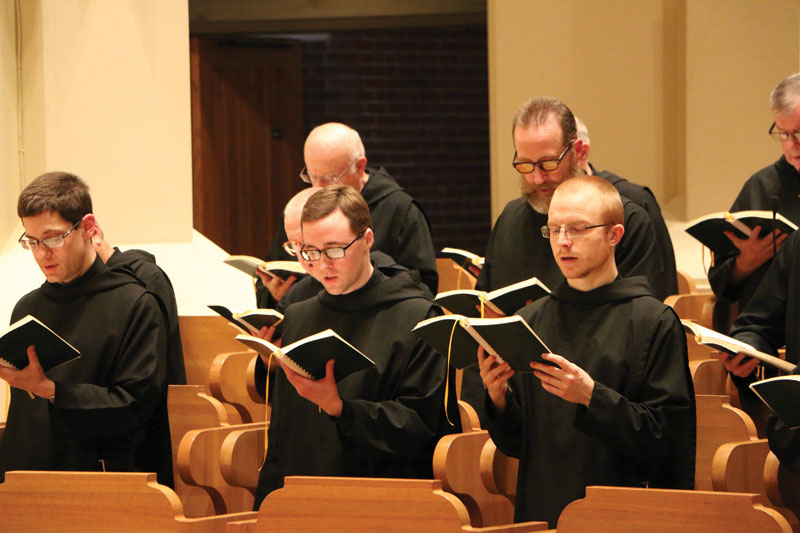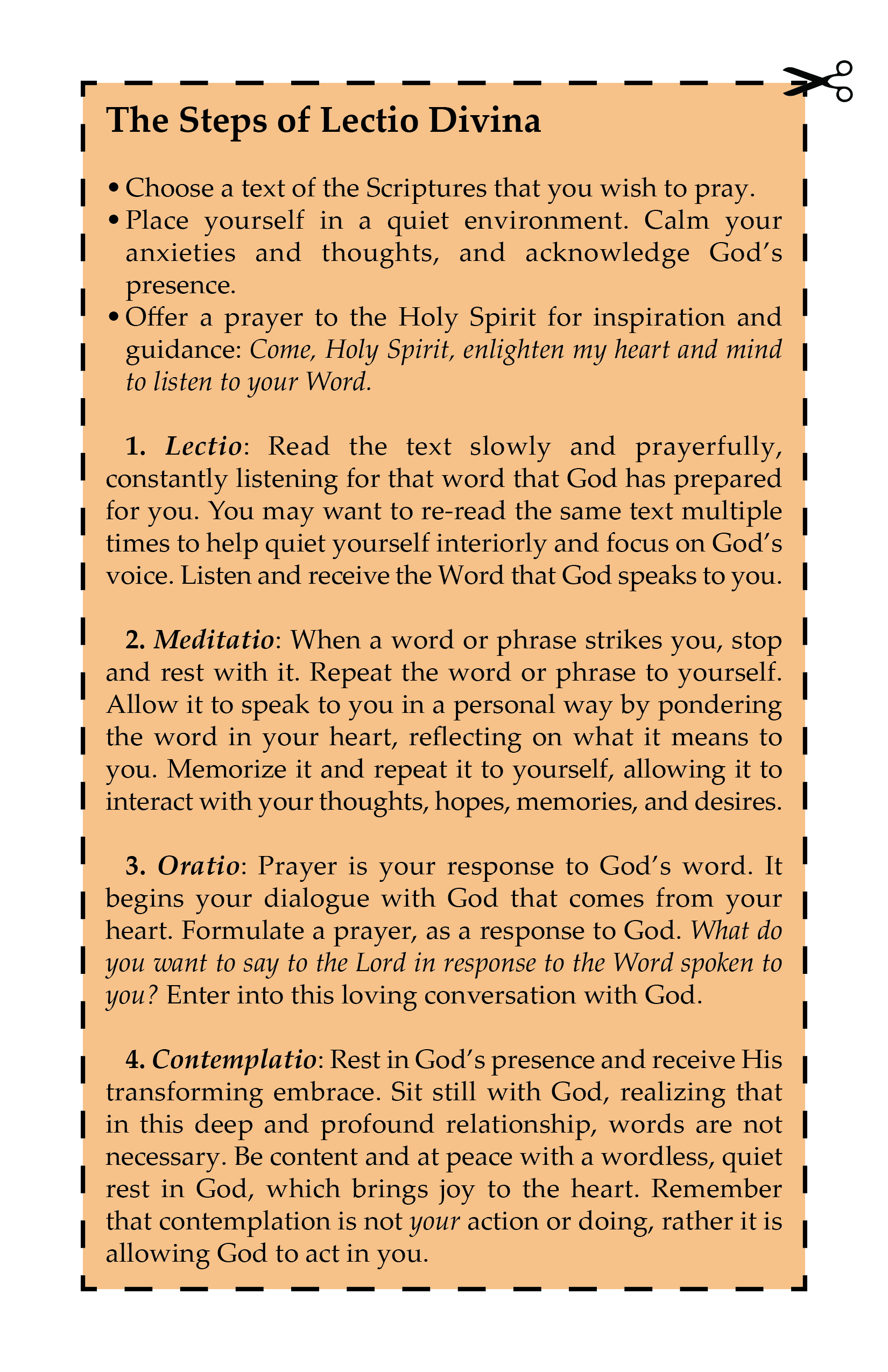
Pray Like a Monk

 Not everyone is called to monastic life, so hopefully you can now take a deep sigh of relief. However, everyone is called to focus on the same goal for which the monks of Conception Abbey strive, namely, eternal life in heaven. This summer I was able to spend a few days visiting my family in Oklahoma. During my visit, I spent some time with my brother’s family—his wife and two young children. I could not help but see how different were the circumstances and daily events of our lives. But, whether your life consists of working eight to five, driving kids to sports or dance practice, enjoying retirement, or living in a monastery—our goal should be the same.
Not everyone is called to monastic life, so hopefully you can now take a deep sigh of relief. However, everyone is called to focus on the same goal for which the monks of Conception Abbey strive, namely, eternal life in heaven. This summer I was able to spend a few days visiting my family in Oklahoma. During my visit, I spent some time with my brother’s family—his wife and two young children. I could not help but see how different were the circumstances and daily events of our lives. But, whether your life consists of working eight to five, driving kids to sports or dance practice, enjoying retirement, or living in a monastery—our goal should be the same.
God, in His infinite wisdom and wonder, created the human person and gave us unique gifts and paths to seek Him above all else. So, however peaceful or fulfilling, chaotic or disorganized your life may be at this very moment, God is inviting and drawing you into a deeper relationship. I invite you to “pray like a monk,” that is, to unite yourself to our monastic community, which draws its wisdom from St. Benedict who instructs us to praise and glorify God in all things.
Prayer Life
How is your prayer life? It is a short, simple question that I ask you that you may reflect briefly on your relationship with God. The most common response I hear is, “My prayer life is okay—but it could be better.” If you find yourself formulating a similar response, then I ask you to consider two further questions: How could your prayer life be better? What would “better” look like?
This is the point where many people get stuck. They know that they desire a better relationship with God, but they are not really sure how to improve their prayer life. It is common for some people even to feel embarrassed to admit that they do not really know how to pray.
A stable and consistent prayer life can be difficult to develop, but let us not focus on the challenges at first, rather let us acknowledge that the desire to encounter Christ in a more profound and meaningful way is already a sign that God’s grace is at work in your life. If you know it can be better and you want it to be better, this is a good starting point.
Daily Prayer
St. Benedict said, “Prayer should therefore be short and pure, unless perhaps it is prolonged under the inspiration of divine grace” (RB 20:4). This instruction is comforting for those who have a demanding workweek, hectic schedule, and are burdened with numerous responsibilities at home to the extent that they may not be able to dedicate large periods of time to prayer. Nevertheless, you should find time in the morning to praise God before your day begins, and offer prayers of thanksgiving during the evening, especially before going to bed. Some people enjoy praying the Psalms, like the monks, as structured by the Liturgy of the Hours, specifically being faithful to Morning and Evening Prayer, but whatever form of prayer you choose, the overarching principle should be to pause at regular intervals to acknowledge God’s presence in order to sanctify the day. You want to be concerned with developing a heartfelt attitude to God while you are praying, offering yourself and your loved ones into God’s loving care.
Many opportunities will arise throughout the day for you to offer brief prayers of trust in God, and you should receive them as inspirations of the Holy Spirit. The aim of monks, and all Christians, is to pray without ceasing, and you can do this by keeping the memory of God alive in your heart and mind at every moment (cf. 1 Thess. 5:17). The monastic community maintains a specific schedule and structure to its day, and to whatever extent this is possible for you, regular times of prayer will make it easier for you and help you to establish good prayer habits.
Lectio Divina
The heart of a monk’s personal prayer is the ancient monastic practice of lectio divina or “sacred reading” which emphasizes a slow, prayerful reading of Sacred Scripture. Intended and ideal for all Christians, this form of prayer allows you to listen to the Word and seek peace in God’s presence. St. Benedict warned his monks, “Idleness is the enemy of the soul. Therefore, the brothers should have specified periods for manual labor as well as for prayerful reading” (RB 48:1). Reflection on the Word of God, if done intensely and prayerfully, has the power of calling you to continual conversion of life. If you are unfamiliar with lectio divina, take a moment to acquaint yourself with the method outlined on the following page.
To put it directly: taking 15-30 minutes a day in a quiet environment to practice lectio divina with Scripture can change your life. A consistent period of time like this can be intimidating for people at the outset, but with patience and perseverance, 15-30 minutes can pass very quickly. Encountering the Word of God each day in a prayerful manner draws us into deeper communion with the One who speaks the word to us. A primary way lectio divina forms you is by making you a more attentive and receptive listener to God.
Expressions of Prayer
Many of us learned early in grade school how to pray the Our Father, the Hail Mary, and the Glory Be. These prayers are essential to our spiritual life and never should be abandoned, especially since the Our Father emerged from Jesus responding to the disciple’s request, “Lord, teach us to pray just as John taught his disciples” (Luke 11:1).
These prayers many of us memorized as children are considered vocal prayer (they are called “vocal” even if they are not explicitly expressed out loud). Imagine your prayer life as a relationship with a friend—vocal prayer is like the groundwork for a relationship. It is the basic day-in and day-out conversation we have with one another. Very often it is not incredibly profound, but it is the means by which we stay connected with others, and it opens the door for deeper conversation when time and circumstances permit.
The Catechism of the Catholic Church outlines the second expression of prayer: meditation. Meditation “is above all, a quest. The mind seeks to understand the why and how of the Christian life, in order to adhere and respond to what the Lord is asking” (CCC 2705). I compare meditation to having a meaningful conversation with a friend. Such conversations are life giving and a deep source of joy and gratitude. In the conversation we can relate the deeper desires of our heart—our hopes, dreams, fears, worries, and challenges. We can only communicate in such a way because we know and trust the other very well. Lectio divina is a form of meditation because we use the Scriptures to engage our thoughts, imagination, emotions, and desires.
The third expression of prayer is contemplative prayer. Contemplation is an intense time of prayer and resting in the peacefulness of God’s embrace. Imagine an elderly married couple at a restaurant. Though they may not be speaking out loud to one another at a particular moment, they are together and the love they have for each other is evident. They enjoy simply being in one another’s presence. A certain peasant sitting before the tabernacle described his experience of contemplative prayer to St. John Vianney in these terms: “I look at him and He looks at me.” Contemplation is gazing on God with the eyes of the heart. Sometimes in prayer, when prompted by grace, words are not necessary.
The Christian tradition of prayer is extensive and the saints and their writings help us to realize that God is continually inviting us to grow in holiness, renew our prayer practices, and deepen our receptivity to God.
United in Christ
You may be like many people in the world who have grown weary of the means we use to seek leisure through Internet, television, and social media and have come to realize that these outlets do not really restore or refresh us on a deep level. You might find yourself restless, jumping from one activity to another, searching for purpose, but not discovering it because God is not the primary focus of that search. The spiritual life is always a journey that we undertake with others. As a friend of Conception Abbey, I invite you to look to our monastic community as a source of spiritual strength and guidance. As best as your life’s circumstances allow, unite yourself to our rhythm of prayer, whether you are near to the monastery or far away. Know that even in your most difficult and troublesome days, you can unite yourself with a group of monks who have committed themselves to praying for your spiritual well-being and the salvation of the entire world.
—Fr. Paul Sheller, O.S.B.
Posted in Daily Life, General, Listen, My Son, Monastery News

